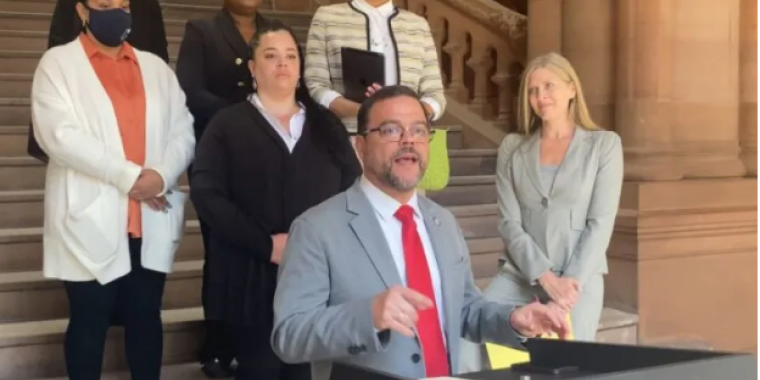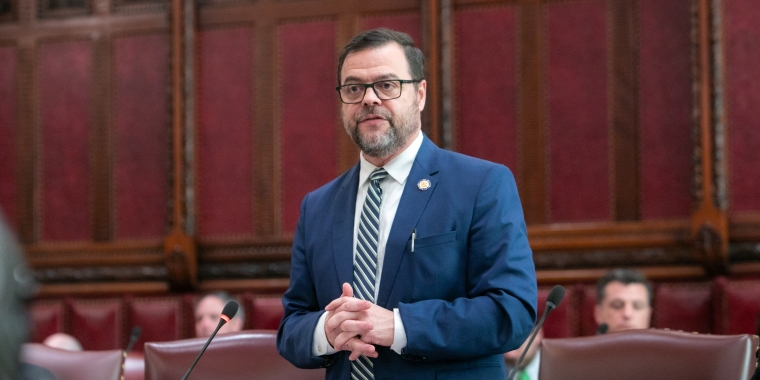
Lawmakers ask state police to review bulk gun and ammo sales News, Sports, Jobs

State Senator Luis Sepulveda, D-Bronx, speaks during a news conference earlier this year at the State Capitol in Albany. photo submitted
Some state legislatures want to give the New York State Police the power to investigate bulk purchases of guns or ammunition.
Senator Luis Sepulveda, D-Bronx, recently introduced S.9555 to amend the state executive statute to give state police the power to develop the rules and regulations for such reviews. Sepulveda proposes a new Section 236 of the state executive law to authorize the Superintendent of the New York State Police to establish and maintain within the department a central archive of information on firearms or ammunition purchased in bulk for use in the Further review as part of the statewide license and records database in accordance with Section 400.02 of the State Criminal Code.
For purposes of this section, the term “firearms or ammunition purchased in bulk” refers to “abnormally large” purchases of firearms, shotguns, or ammunition. The Superintendent of State Police is also required to issue regulations mandating reporting procedures for any firearm or ammunition purchases made in bulk using a credit card, debit card, PayPal, e-wallet, e-check, Lyra, or other payment system.
Sepulveda cited a 2018 New York Times investigation that found eight cases in which mass shooters used credit cards to purchase large amounts of guns and ammunition before committing crimes. Those cases include the Pulse nightclub shooting in Orlando, Fla., when the shooter bought two firearms and thousands of rounds of ammunition using six different credit cards in two weeks, totaling $26,000. The shooter at a movie theater in Aurora, Colorado, used credit cards to buy more than $11,000 worth of guns, grenades, a gas mask and other military equipment before the shooting. In the decade from 2008 to 2018, there were 13 shootings that killed 10 or more people, and in at least eight of those, the killers used credit cards to fund their attacks. Some used loans to purchase firearms they otherwise could not have afforded.
“These eight shootings killed 217 people,” Sepulveda wrote in its explanatory memorandum. “Subsequent investigations uncovered a wealth of information about the killers’ loan expenditures.”
The type of verification Sepulveda requires is reminiscent of requests for credit card companies to separately categorize sales in gun shops. Visa Inc. announced in September that it would categorize gun sales transactions separately and join Mastercard and American Express. According to the Associated Press, Visa announced it would adopt the International Organization for Standardization’s new trade code for arms sales, which was announced Friday. Until Friday, gun store sales were considered “common merchandise.”
“As banks and credit card companies appear unwilling to combat their unwittingly funded mass shootings by reporting large gun purchases to law enforcement, it is up to the state of New York to take steps to protect its residents and to investigate the mass purchase of firearms and ammunition for potential criminal activity,” Sepulveda wrote in its explanatory memorandum.
According to the AP, Visa’s adoption as the largest payments network is significant and, with Mastercard and AmeEx, will likely put pressure on card issuer banks to adopt the standard as well. Visa acts as an intermediary between dealers and banks, and it is up to the banks to decide whether to allow their issued cards to be sold in gun shops.
Gov. Kathy Hochul, dozens of lawmakers, Attorney General Letitia James and New York Mayor Eric Adams are among officials who have urged credit card companies to introduce sale codes specifically for firearm sales. The AP reported in September that there are now retailer category codes for almost every type of purchase, including those made at supermarkets, clothing stores, coffee shops and many other retailers.
“When you buy a plane ticket or pay for your groceries, your credit card company has a special code for these retailers. It’s just common sense that we have the same policies for gun and ammo deals,” Adams told the AP.
Gun rights advocates argue that tracking sales at gun stores would unfairly target legal gun purchases, since dealer codes only track the type of dealer at which the credit or debit card is used and not the actual items purchased. Selling a gun safe worth thousands of dollars and an item that qualifies as part of responsible gun ownership could only be viewed as a large purchase at a gun store.
“The (industry’s) decision to create a firearms-specific code is nothing more than a surrender to anti-gun politicians and activists bent on undermining the rights of law-abiding Americans with one transaction at a time,” Lars said Dalseide, a spokesman for the Landesschützenverband.


